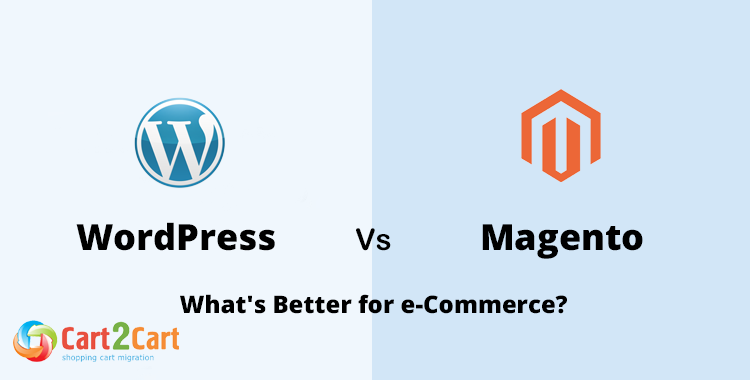With a significant combined market share, both eCommerce platforms enjoy a fair amount of popularity among online merchants. Whether one solution is better than the other comes down to the size of your enterprise and how big a budget you have to work with. For insights into planning your move, consider our pre-migration tips.
What Are Magento and WordPress?
Right off the bat, Magento and WordPress are both eCommerce solutions for building online retail stores. While you can use either of them to set up your online store, there are some fundamental differences between them with regard to the level of technical know-how required to work with them.
Magento vs WordPress Comparison Table
|
Feature |
Magento |
WordPress |
|
Primary Use |
E-commerce platform |
Content management system (CMS) |
|
Themes & Plugins |
Thousands of themes and extensions |
Thousands of themes and plugins |
|
SEO Capabilities |
Excellent SEO features, built for e-commerce |
Excellent SEO features, can be enhanced |
|
Performance |
Resource-intensive, may require strong hosting |
Generally faster, depends on plugins/theme |
|
Security |
High level of security, regular updates |
High level of security, regular updates |
|
Scalability |
Highly scalable, suited for large stores |
Scalable, but may require optimization |
|
Community Support |
Strong community, extensive documentation |
Large community, extensive documentation |
Pros and Cons of Magento vs WordPress
Magento Pros
- Highly customizable platform for large-scale eCommerce.
- Robust feature set tailored for eCommerce businesses.
- Scalable to support growing businesses with extensive product catalogs.
- Strong security features and regular updates.
- Large community of developers and extensive documentation.
Magento Cons
- Requires technical expertise to set up and manage.
- Higher hosting costs compared to other platforms.
- Complex customization can be time-consuming and costly.
- Limited themes and extensions compared to WordPress.
WordPress Pros
- User-friendly interface suitable for beginners.
- Extensive library of themes and plugins for customization.
- Flexible platform for different types of websites, not just eCommerce.
- Cost-effective with many free themes and plugins available.
- Large community support and comprehensive documentation.
WordPress Cons
- Requires multiple plugins to achieve full eCommerce functionality.
- Can be less secure without proper maintenance and security measures.
- Performance can be affected by the number of installed plugins.
- Not specifically tailored for eCommerce, requiring additional setup and configuration.
Ease of Use: Magento vs WordPress
When comparing Magento vs WordPress in terms of ease of use, it's important to recognize the distinct purposes each platform serves. WordPress is widely known for its user-friendly interface and accessibility, making it a popular choice for bloggers and small businesses. With its straightforward dashboard and extensive library of plugins and themes, users can quickly set up and manage their sites without requiring advanced technical skills. The simplicity and flexibility of WordPress cater to users who prioritize ease of use and rapid deployment.
In contrast, Magento is a robust eCommerce platform designed for larger businesses and enterprises. While it offers a comprehensive suite of features tailored to online stores, its complexity can be overwhelming for beginners. Magento's advanced functionalities, such as multi-store management and extensive customization options, require a steeper learning curve. However, for those with technical expertise or the resources to hire developers, Magento provides unparalleled scalability and control over the eCommerce experience.
Despite their differences, Magento and WordPress each have their own strengths in terms of usability. WordPress excels in simplicity and ease of access, ideal for content-driven websites and small to medium-sized eCommerce stores. On the other hand, Magento's powerful features and flexibility make it the go-to choice for large-scale online businesses that require more intricate and customizable solutions. Ultimately, the choice between Magento vs WordPress depends on the specific needs and technical capabilities of the user.
Pricing: Magento vs WordPress
When comparing Magento vs WordPress for pricing, the choice often hinges on the scale and complexity of your e-commerce needs. Magento, known for its robustness in handling large-scale online stores, typically requires a higher initial investment due to its advanced features tailored for enterprise-level solutions. Our Premium Data Migration Service can assist with complex transitions. Conversely, WordPress, with its versatility and extensive plugin ecosystem, offers a more budget-friendly entry point, especially suitable for smaller businesses or startups looking to establish an online presence quickly.
Magento and WordPress each offer distinct pricing structures that cater to different business needs. Magento, with its Adobe Commerce (formerly Magento Commerce) and Magento Open Source editions, provides flexibility in licensing options. Businesses can opt for the Open Source edition for a free, open platform or invest in the Commerce edition for enhanced features and support. In contrast, WordPress operates on a more straightforward model where the core platform is free, but costs can accumulate based on chosen themes, plugins, and additional services required for e-commerce functionality.
When deciding between Magento or WordPress, businesses must consider not only initial costs but also long-term scalability and maintenance expenses. Magento's robust capabilities in handling complex product catalogs and extensive customization options make it a powerful choice for large enterprises. On the other hand, WordPress's user-friendly interface and extensive community support make it a compelling option for smaller businesses seeking a cost-effective solution without compromising on essential e-commerce features.
Design Options: Magento vs WordPress
When comparing design options, Magento and WordPress offer distinct approaches. Magento vs WordPress presents a contrast in flexibility and scalability. Magento and WordPress are both robust platforms, but cater to different needs. Magento specializes in e-commerce, offering extensive customization for online stores. Its themes are tailored for product showcases and sales optimization, emphasizing transactional functionalities.
On the other hand, Magento vs WordPress for non-e-commerce sites shows WordPress’s strength. WordPress provides versatile design templates suitable for various industries, often leveraging its ecosystem, including seamless WooCommerce integrations. Whether choosing Magento and WordPress for e-commerce or general web development, understanding design needs and scalability preferences is crucial for optimal platform selection.
WordPress vs. Magento for Ecommerce – The Verdict
Magento and WordPress are both capable of building robust and scalable online stores. The choice of one over the other ultimately comes down to your business’s priorities. If you’re looking for a powerful eCommerce platform and have the financial muscle to outsource the web development aspect of its design to experts, then Magento would be a natural choice.
On the other hand, if you have a tighter budget to work with and lack the resources required to onboard a web developer to build your online store for you (meaning you intend to do it yourself), WordPress would be a better option. It is more user-friendly than Magneto and even offers free themes that you can customize to align with your brand messaging.
Are you looking to switch from your current eCommerce provider to Magento or WordPress? Our fully automated shopping cart migration tool can help you re-platform your store in a few clicks with no downtime or data loss.
Want to see Cart2Cart in action? Sign up today for a free demo.
FAQs
Is WordPress better than Magento?
Not necessarily. The choice between WordPress or Magento comes down to your business priorities. If your primary goal is to scale and drive online sales, Magento might be the better solution. However, it does have a higher cost implication you need to consider.
On the other hand, if your business objectives center on content marketing as the primary means of driving traffic to your eCommerce website and have a somewhat more restricted budget to work with, you're better off choosing WordPress.
Which is better – Magento or WooCommerce?
Magento is built for large-scale enterprises that have the budget to outsource the building and management of their online stores to third-party developers. WooCommerce, on the other hand, is more geared toward small and medium-scale businesses that may not have the same financial muscle as their large-scale counterparts.
Overall, both platforms are capable of building exceptional online stores. It is a question of what your business’s short and long-term goals are.
Can I use Magento in WordPress?
Yes, it's possible through various third-party extensions and custom development. These solutions allow you to integrate your Magento product catalog with a WordPress site, displaying products on your WordPress pages and posts while managing the backend eCommerce functionality through Magento. If you’re looking to use Magento in WordPress, exploring the available marketplace plugins would be your best bet.
Is Magento the best eCommerce platform?
“Best” is subjective. It all depends on the size of your business, your long-term goals, your technical expertise, and your budget. If you have a large-scale enterprise whose main objective is to scale, and you have the budget to outsource web development to a professional, then Magento would be the best eCommerce platform for you. If you have a smaller budget to work with and are looking for a more user-friendly eCommerce option, WooCommerce would be a better fit.
Monthly Update – January 2026
Entering 2026, the e-commerce landscape continues its rapid evolution, with businesses on platforms like Magento and WordPress (via WooCommerce) increasingly focusing on advanced personalization and operational efficiency. The integration of AI remains a top priority, offering sophisticated analytics for customer behavior, automated inventory management, and hyper-targeted marketing campaigns. Merchants should look into AI-powered chatbots for improved customer service and predictive analytics to forecast sales trends, minimizing waste and optimizing stock levels. Furthermore, the push towards headless commerce architectures is gaining momentum, providing greater flexibility for front-end design and enabling seamless omnichannel experiences across web, mobile, and emerging digital touchpoints. For those considering a platform switch or an upgrade, prioritizing solutions that support an API-first approach will be crucial for future scalability and adaptability. Lastly, sustainability in supply chains and transparent ethical practices are no longer just a trend but a consumer expectation. E-commerce businesses should audit their operations to align with these values, enhancing brand loyalty and attracting a new generation of conscious buyers. Staying agile and adopting these innovations will be key to thriving in the competitive digital market of 2026.
For more details, explore our FAQ section or schedule a call with a migration expert.








